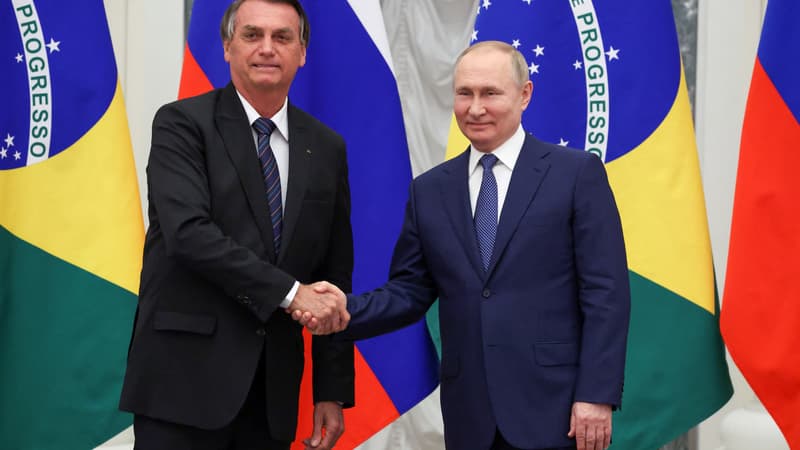By triggering the invasion of Ukraine by his troops, Vladimir Putin not only plunged his country into a hellish spiral dotted with defeats, but also removed it from the international arena.
It is true that the Ukrainian dossier has long poisoned the Kremlin’s relations with its former partners. Thus, its annexation of Crimea at the turn of the years 2014-2015 had already caused the exclusion of Russia from the G8, reconverted into the G7. But the current war isolates him even more deeply. Alone against all, then, the autocrat’s Russia? Not at all.
Putin’s South American Network
In fact, you can still count on some support abroad. But these are generally nations that are marginalized. The calculation is quickly done as far as Europe is concerned: Alexander Lukashenko’s Belarus stands next to Russia as a faithful vassal, but that is all.
Vladimir Putin, on the other hand, can count on more sympathy on the South American continent. Legacy of his long friendship with the USSR, and corollary of his opposition to the United States, the historic Cuban ally does not let go of Moscow. The Venezuela of Nicolás Maduro takes a similar position. The Nicaragua of dictator Daniel Ortega is also along the same lines.
Brazil, on the other hand, oscillates from one side to the other, between denouncing the war and maintaining very concrete relations with the invader. Thus, last February he joined the UN’s condemnation of the invasion, however, in mid-July, his Foreign Minister, Carlos Alberto Franco França, indicated that his country would buy “all the diesel” it could from Russia. . , even touting a “strategic partnership.”
Relays in the East
In the Middle East, the Syria of Bashar al-Assad confirms its link with the Kremlin, like the Iran of the ayatollahs, also on the boil. The drones used by Russia on Wednesday to attack 80 km south of Kyiv were also made by Iran.
At the other end of the East, North Korea – which again fired two ballistic missiles into the Sea of Japan on Thursday – is still leaning against Russia, like the dictatorship that rules Burma.
neutrality (benevolent)
But there are more or less vibrant or cautious supports. Interviewed on Wednesday night during our special program dedicated to the war between Russia and Ukraine, Sylvie Bermann, BFMTV consultant for diplomatic affairs and former French ambassador in Moscow, pointed out that many had preferred to take refuge in a form of neutrality in the face of the conflict. .
“A hundred countries had refused last spring to request the exclusion of Russia from the Human Rights Council of the East,” he introduced.
This reservation is based on two arguments. “Many consider this to be a regional war, a European war,” the diplomat pointed out before adding: “They also say: ‘When there is a war in our regions, like in Yemen, you don’t care.’ support as such, but countries that refuse to condemn Russia.
These friends who walk away
The platoon of these non-aligned has also seen its ranks swell as Russia stepped up its military effort against Ukraine. And the movement has notably involved historical friends of the Federation. Thus, the Kazakhstan of President Tokayev, however, a fundamental piece of Russia in Central Asia, has distanced itself, even welcoming many Russians fleeing the “partial mobilization” desired by the executive.
India, also closely associated with Russia, stood firm but ended up publicly disavowing it. On September 16, meeting with Vladimir Putin on the sidelines of a Shanghai Cooperation Organization summit, Indian Prime Minister Narendra Modi said “this is not the time for war.”
The Chinese case
But it is above all the position of China, a geopolitical giant and rival of the US power, that is the focus of international attention. And she is moving more and more towards an intermediate position.
“China is very embarrassed by this war,” analyzed Sylvie Bermann.
“It also suffers the consequences economically and weakens its main partner against the United States.” He delivered the message during a meeting in Samarkand, saying a ceasefire was needed guaranteeing the security concerns of both countries. So, actually, it will be not to go against Russia,” he explains.
At critical moments, such as during the UN Security Council meeting three weeks ago to sanction Russia’s announced annexations of the Ukrainian territories of Donetsk, Luhansk, Kherson and Zaporizhia, China abstained. Like India, Brazil… And Gabon, one of the few African countries benevolent with the Kremlin.
But the situation is changing and the tectonics of these geopolitical plates could still move. “On Monday there is a new meeting of the United Nations General Assembly after the failure of the vote in the Security Council, and we can take a new picture of what is called ‘Putin’s isolation’, which is undoubtedly exaggerated compared to the world”, Sylvie Bermann finally summed up on our set.
Source: BFM TV


